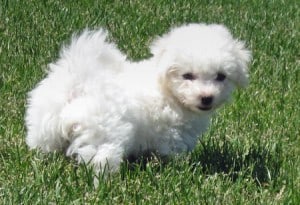From the desk of Sharda Baker.
Monday, March 17, 2014
Hi and welcome everyone!
This is Sharda with another Bichon Frise newsletter!
As promised, today we will continue to take a look at the Bichon Frise Puppy development stages.
We will continue from week 16 – maturity.
Let’s start!
WEEKS 16 THROUGH TO 8 MONTHS
As with any breed of dog, this is the challenging period roughly equivalent to the early teen years that we humans all go through. Young adult Bichon Frise may start to show a slight independent streak that usually translates into selectively ignoring commands or even flat out refusing to follow instructions.
In addition, the Bichon Frise at this age may start to show more hormonally driven behaviour depending on how fast they mature.
Males will typically become slightly more dominant and may start to engage in marking behaviours, attempting to run and roam when out of the house, and paying much more attention to female dogs.
If you have a male Bichon Frise at this age that has not been neutered it is very important to keep them isolated from any females in heat or keep the females secured and away from the male as they may be capable of breeding even at this young age.
Most vets and breeders now recommend early spaying and neutering rather than later.
If at all possible, contact your vet and set an appointment to have Bichon Frise examined to see if he or she can be spayed or neutered at this time. In some cases the vet may recommend waiting a month or two more if the dog is not quit mature enough or developed enough.
Continuing with a consistent, positive training program is essential at this time.
Many owners choose to enroll themselves and their Bichon Frise young dog in more advanced obedience classes to help deal with this somewhat challenging developmental stage.
MONTH 8 TO MONTH 14
Sometime around the first part of the eighth month or occasionally before the eight month, Bichon Frise puppies will again seem to enter a period of being more afraid of new things than they have been in the past.
As with the earlier fear stage, this is best addressed by continued, safe and controlled socialization and interactions.
Avoid trying to protect or shelter your dog from safe interactions at this time as this can reinforce their isolation and lead to socialization problems as the dog matures. The Bichon Frise, at this time, is full of merriment and energy.
The Bichon Frise dog will need lots of time to run and play and should also enjoy spending some quiet companion time with the family. They will be outgoing clowns in many cases, seeming to delight in getting the family laughing and involved in a game or chase.
MATURITY
As the Bichon Frise matures, you will only find that he or she is more attached, loving, and involved with the family every year.
A Bichon Frise is a breed that stays playful and puppy-like well into their senior years. The Bichon Frise will typically be as eager to go for a walk at 14 as he or she was at 14 months.
Many Bichon Frise will live to be over sixteen years of age with proper routine veterinary care and healthy nutrition, exercise and living.
Consistent training and challenging the Bichon Frise to learn new tricks, commands, and routines will keep reinforcing the learning that has already occurred and will keep the dog mentally and physically active and stimulated.
As the Bichon Frise matures, you may also notice that he or she becomes a bit more set in his or her ways, so an occasional refresher obedience class is often just the key to keeping things moving along smoothly.
Many owners also find that agility classes and competitions are also great to keep the Bichon Frise active and learning new skills through his or her life.
Well, that’s it! We’re finally done in talking about the stages of these Bichon Frise puppies’ development.
I hope that you learned a lot from today’s Bichon Frise newsletter!
All the best and take care
Warmly,
Sharda Baker

